#Sokka meta
Text
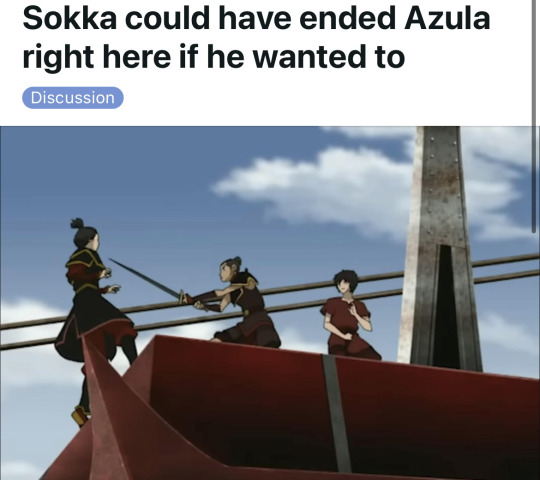
Sokka could have killed Azula if he wanted to, indeed. He could force her to retreat even more, cause I her to fall. He could stab her. He didn't. He retreated and let Zuko throw a fireball at her, one that she managed to avoid.
That says a lot about Sokka and about everyone else on that rooftop as well.
Sokka didn't want to kill Azula. He could. And it would be convenient for him a Team Avatar if he had. But despite her imprisoning his dad and girlfriend, and ruining his dobs plan and killing his best friend and almost harming his sister on multiple occasions, he still doesn't want to kill Azula.
However, I don't think it's about being a good person or anything like that. Sokka was never afraid to do sketchy shit if that's what needed to be done. He invaded the Fire Nation when they were at their weakest. He crashed airships, killing hundreds, without even giving it a second thought. He killed the Combustion man without flinching. He wouldn't be afraid to kill Azula if that's what he thought was necessary.
And yet, he didn't. There could be multiple reasons why. It could be that he feared if the most important person (by FN standards) in the elevator thingy was dead, the guards wouldn't hesitate to cut the line immediately. It could be that he thought they had a chance of capturing her and having a vulnerable hostage, since they had better numbers. It could be for Zuko's sake. As a brother, it's possible he wouldn't be interested in killing a little sister infront of her older brother.
As for Suki and Zuko... They don't hate Azula. Sokka just threw away an opportunity of getting rid of an enemy and none of his allies that saw it were bothered. No one said "wtf are you doing? Why would you do that? You could have saved us so much trouble!". They are not eager to see Azula dead despite her being their enemy. Suki doesn't hate Azula, even after Azula imprisoned her. And Zuko doesn't hate Azula either, so all the fics of him having Azula endure any kind of torture are ooc, and they need to be stopped.
No, seriously, stop it.
When it comes to Ty Lee, I noticed that she didn't react to her friend almost dying? I don't think it because Ty Lee doesn't care for Azula, so it's either that she didn't notice because she was busy, or that she had trust in Azula's abilities to make it out alive.
And Azula is... interesting. She either doesn't value her life, or she values it, but she values her duty more. There's no other option. Because how TF is half your foot touching sweet death, and then you just continue without flinching or being scared or anything? You just move on? Honestly, whether Azula doesn't care about being alive that much, or does care, but would still find it honorable to die on duty, it's still interesting. It creates lot of questions about Azula's mental state at the moment and about her dedication to her father and country. Where does it end?
If it's neither of the two, then Azula was just being an arrogant-ass motherfucker which also creates questions. Is it because she trusted her own abilities a lot? Is it because she believed Zuko wouldn't let her die? Is it because she thought Sokka wouldn't kill her? And why is that? Does she consider him soft, cause he didn't hurt her in the dobs, or does he consider him too weak to kill her? And is that because he's a "water tribe savage" or because he's a nonbender?
Every time Azula is on screen, there are so many things to analyze!!
188 notes
·
View notes
Text
I know that when Sokka is training the kids in the first episode of the show, it gets treated as comedy. Particularly when they all ask to use the bathroom. But when you think about it? It's actually disturbing that he even has to do this at all.
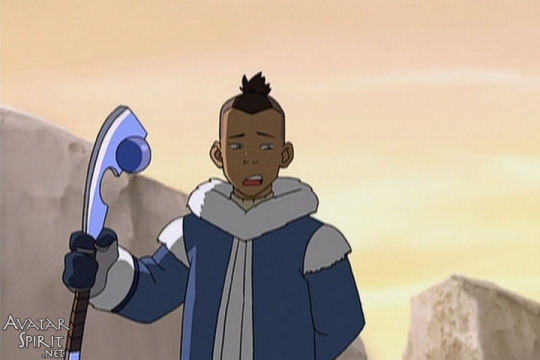

Look at these kids. They can't be no older than 5 or 6. And yet they are being trained for combat. They have absolutely no idea what the horrors of war are truly like. But because of the war, this is their childhood. It's sad.
519 notes
·
View notes
Text
This is absolutely nothing to do with the Netflix show I haven’t even watched that thing but I’m once again thinking about Sokka and Sokkas Master again and going insane.
Especially with how Sokka was never supposed to be a warrior. Like fundamentally he’s just not built for that kind of life. He was born into war and has been basically been told and trained to believe that one day he is going to die for his tribe and especially for his sister and that’s his destiny and he’s like okay that’s my job that’s what I do and everyone in the tribe knows this and sees this as my role as I am the only man left. (I sincerely doubt a bunch of woman and old people were actually looking at this kid as the last warrior seriously until he went to fight the fire nation BY HIMSELF but that’s not the point, the point is he was doing it)
But but the thing about Sokka is he’s not a fighter, he’s a scholar to his core. He doesn’t win hand to hand against Zuko but he does get a hit in with his boomerang that takes an insane amount of math to do perfectly and even though he loses the fight we realise already that Sokka is coming at this war from a different angle that anyone else is.
Like Sokka knows when he joins Aang he doesn’t have as much to bring to the team, he basically assigns himself the role of provider and bodyguard and is now willing to die for both of them because they are two of the most important people in the world and he could have been cynical the entire time. He was prepared to be cynical. Until he goes to Kyoshi gets his shit rocked by a girl and is like oh damn there’s different ways to go about fighting and war and I actually don’t know a lot of it can you super pretty warrior lady teach me your ways and from that moment on Sokka becomes a student.
He gets the mark of the wise with Bato, he figures out how to get Katara on that prison ship and that the fortune teller is a hoax and gets the water bending scroll all through thinking things through not fighting them head on. He invents the fricken war ballon and it’s so clear that all his thinking is now coming at things from an angle no one expects which is so perfect for this war in particular considering it’s been basically a slow tug of war between the Earth Kingdom and the Fire Nation for decades. He’s looking at these things and he’s like hey I’m not a bender but I do know how benders think and how a lot of people think because I’m trying to figure out how the world works. Like by the time he gets to North he isn’t as great with the weapons because again HES NOT A FIGHTER AT HEART but he is a thinker and he points out all the holes in the Norths strategy with full confidence.
Like in book 2 all his thoughts are about winning and out thinking the enemy. He learns about the library and gets so genuine excited about it but he can’t be a true nerd cause of his responsibilities but he basically plans a way to win the war, learns haikus, try’s art, gets into wrestling and learns so much about other cultures and skills he’s always thinking and winning and no longer doing things on impulse.
But of course he still feels insecure about that and doesn’t see his brain as his true weapon because he was supposed to be the warrior. That’s his role.
So he goes to Piandao who sees all of that and sees how Sokka is so so smart and eager to learn and think in ways that no one expects and he nurtures that. He teaches him art and calligraphy and gives him a Jian! He gives Sokka a Jian "The Gentleman of Weapons" not Dao even though Dao are made for soilders and Jian are for scholars, nobels and people who have time for proper sword craft. (Not to mention the fact they are primarily used for Tai Chi which is also the base for water bending which is just a detail I love). Like the Jian is a sword for scholars it’s for scholars!!!
Sokkas a thinker not a fighter and that’s so amazing to me.
Like he starts as the boy that took on a fire nation ship by himself then ends the series as the guy who’s strategies won the war, a trusted advisor for basically anyone of importance because they know he’s smart and are willing to listen to his ideas and with such a happy future for him to grow without the weight of having to be a fighter weighing him down cause that’s not who he’s supposed to be.
#I love Piandao#me and the Sokka girlies are all stanning Piandao#atla#sokka#avatar: the last airbender#avatar the legend of aang#atla sokka#Sokka meta#zee rambles#I’m researching swords for my tgcf fic and got emotional about my boy
60 notes
·
View notes
Text
In a recent meta on Aang sparing Ozai I mentioned Aang's need to humble himself before he meets the lion turtle. (Funnily enough, I noted a lack of foreshadowing, which I might disprove now). I cited Master Piandao only taught Sokka once he'd humbled himself in Sokka's Master, as an example of this being a recurring theme in the show.
In that very same episode, images of lion turtles can be seen in the background.


Sokka humbles himself, and that pleased the person with lion turtle imagery. And after Aang humbles himself, the lion turtle is pleased too.
#I LOVE THIS SHOW!!#atla meta#avatar the last airbender meta#avatar: the last airbender meta#atla sokka#atla aang#aang meta#sokka meta#lion turtle#avatar aang#atla#avatar the last airbender#avatar: the last airbender#sokka's master#sozin's comet#sozins comet#atla ending#atla finale#Master Piandao#piandao#sokkas master#atla analysis
27 notes
·
View notes
Text
And please reblog for a larger sample size and put your reasons for voting the way you did in the tags.
36 notes
·
View notes
Text
If Sokka does something as a job in a modern AU it has to be something with engineering, the boy clearly has talent for it, just look what he build on an island for Appa, the design alone is pretty good.
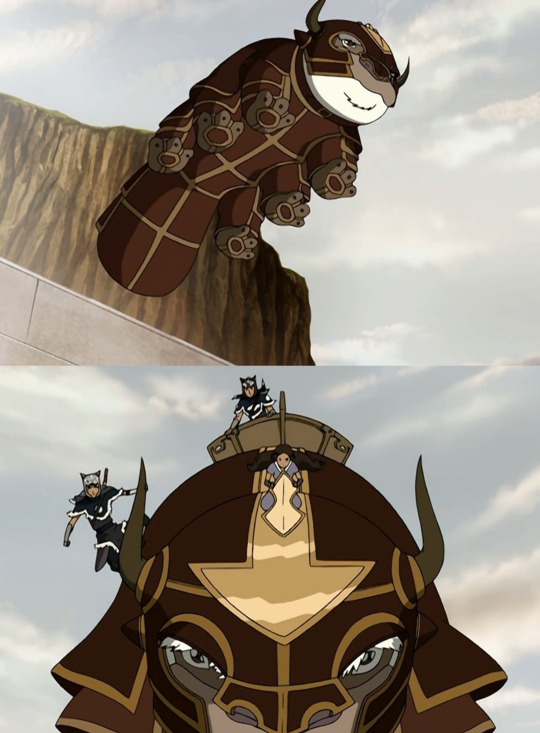
It wouldn’t even have to be modern AU, I also hc him in apprenticeship with the Mechanist, for some time after the war.
33 notes
·
View notes
Text
Katara gets a lot of hate for trusting Jet over Sokka
Quite a lot. I think there are a number of reasons for the hate, but I want to discuss why it’s understandable that she trusted Jet instead of Sokka.


Every new person Sokka has met until that point he viewed as an enemy and dangerous. And every time he was wrong. Aang was not only friendly, but a bender, an airbender, which were thought to be extinct. He brought joy to the Southern Water Tribe, something they lost in the war. And he’s the Avatar. The literal hope to end the war.
Haru. Another bender. Someone who also was separated from a parent and would be captured if discovered. The episode misses the mark, but there are crazy parallels between him and Katara.
Both times Sokka was wrong and while it did endanger Katara and the others, both times they ended positively.
Everyone brings up this as Sokka’s episode. Except they forget it’s Sokka’s episode because this is the FIRST time his instincts were right.
Sokka has had a series of being wrong before this. From the beginning he viewed Katara’s bending as pointless and weird. He didn’t see the point of Aang bringing joy and fun to the village. He wanted Aang permanently banished, which didn’t happen or the village may have been burned down. He didn’t think Appa could fly, which if he was right, they wouldn’t have been able to save Aang.
He thought girls couldn’t also be warriors and spent the whole episode unlearning that. With Katara being the only one pointing out that it was too dangerous to stay in one place.
He wanted to go face a spirit to help Aang, something he has zero experience with and ended up getting captured for it.
He was right about the pirates in the previous episode, but I don’t like how he got the highground when he opened the series mocking her for her bending or that no one pointed out how important waterbending was to her.
And looking at it carefully, he was technically wrong in the long run since that greatly helped Katara to face Pakku, so it was important.
Even if you look at “Jet”, he still starts off wrong. Traveling on foot would take much longer and they still run the risk of running into soldiers, like what happened. He also wanted to be the leader despite, yet again, having had no good plans or opinions until that point.
His plan to escape the soldiers was to bluff.
He did come up with the plan to free Haru and the other earthbenders, but the plan to get captured was Katara’s, and the reason they even bothered helping the earthbenders was because of Katara. Not saying Sokka doesn’t deserve credit. He does. But that only happened because Katara pushed against his opinion.
And then he hated Jet before he knew Jet’s plans. And was very obvious about it.

Mind you Katara was right about Sokka being angry that Suki was able to beat him. And she knew from experience that Sokka hated bending, particularly hers. And he wanted to be leader. Katara knew her brother.
Maybe she didn’t realize Sokka didn’t have that much confidence at that point and was insecure over his abilities.
And was very clearly jealous because of it.
She had no reason to think anything was different this time.
It wasn’t that she trusted a random guy over her own brother. It was that Katara knew Sokka well and all past experience with him suggested he was suspicious because he’s always suspicious, he was insecure because he feels he needs to prove himself, and he was jumping to conclusions.
60 notes
·
View notes
Note
How come Sokka grew to be sexist?
He's a teenage guy in a medieval society and was the only guy left in the village and expected to protect it. He also had a little sister to annoy with said sexism.
Also the writers just needed someone to be sexist to do a girl power episode and Aang was too nice to fit.
Thanks for the ask ^^
3 notes
·
View notes
Text
Do you ever think about how 1 of the 1st waterbending moves that Katara learns, that she doesn’t come up with herself, is the water whip that she learns from that waterbending scroll, which also happens to be 1 of the final moves that she uses against Azula, using that move to manoeuvre Azula into a place more favourable for Katara??
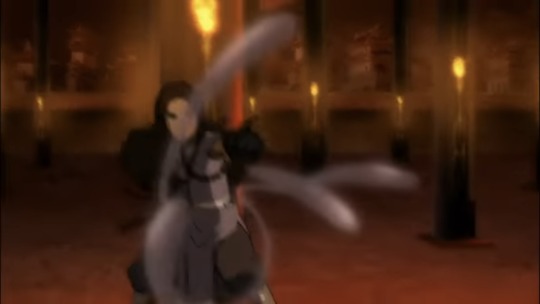
Do you ever think about how in that same episode that Katara learns that, Sokka tries to steer a boat, and laments how he doesn’t know how, because that boat wasn’t made by The Southern Water Tribe, and then, later, steers an entire Fire Nation war balloon with precision and intent, and knows how to destroy them effectively and efficiently, while also being a co-inventor of the inspiration invention of those Fire Nation war balloons??
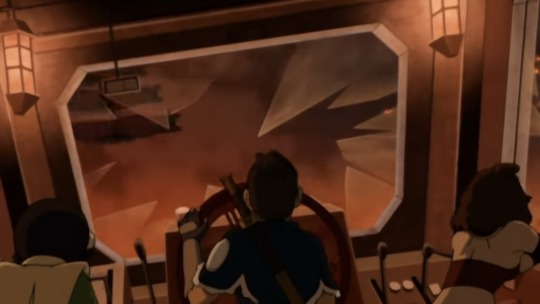
Do you ever think about how, when face-to-face with The Avatar in the Avatar State, after repeatedly threatening to imminently kill that Avatar like the other Air Nomads, Ozai’s 1st move is to firebend directly towards Aang’s left side of his face, the exact same spot that Zuko has his scar on??
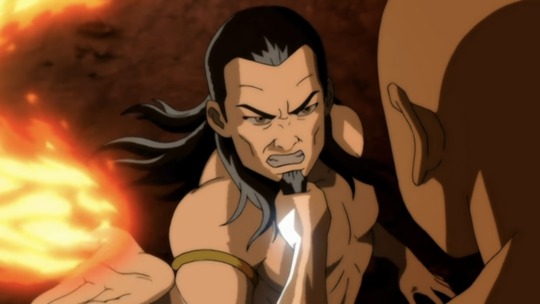
Do you ever think about how Zuko was challenged to his 1st Angi Kai due to his desire to protect people being unnecessarily put in harms way, and his final Angi Kai was ended due to the same reason??

#Avatar#Avatar: The Last Airbender#ATLA#Katara#Sokka#Zuko#Aang#Azula#Ozai#A:TLA#ATLA meta#Tess Speaks#Buffy Speaks
9K notes
·
View notes
Text
culture tips for writing asian settings: calligraphy (pt i)
i love chinese calligraphy, to me it is just so gorgeous and i've dedicated a few scenes of my own fics to it, so here are just a few quick 'n' dirty calligraphy tips:

the calligraphy scene in sokka's master (illustrated by korean animators!) is a pretty good depiction tbh. you write using a brush (the brushes can be hung up on a stand too)—it can be jarring to see fics mention quills or parchment. one excellent detail from the show is that sokka, who seems left-handed, has to write with his right hand—the left hand holds the sleeve out of the way. the ink is not liquid/bottled, but is in a solid stick form and has to be ground on an inkstone mixed with water

traditionally, chinese text is written downwards, and goes from right to left across the page.
as with any other form of calligraphy, chinese calligraphy emphasises beauty of form over legibility—in the same way you wouldn't really consider times new roman font 'calligraphy'. there are different types of script in chinese, and for someone like piandao to master them is a reflection of his education and gentility. the semi-cursive below i see quite commonly in calligraphy:
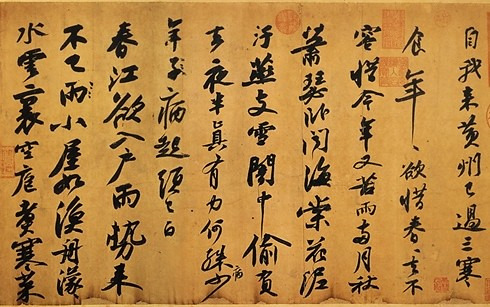
then you might have something like the cursive below is quite technical but seriously hard to read
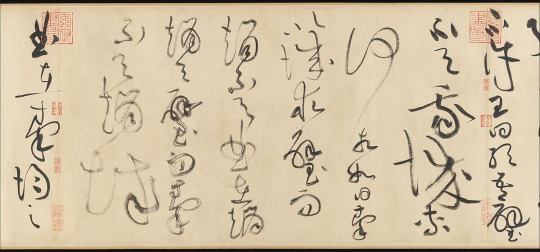
contrast that with something like this seal script, harking back to an older era of chinese script:

any calligrapher worth their salt will be putting their stamp on the work, quite literally! name seals, also called "chops", are carved out of stone; ink it up with cinnabar paste and stamp it onto your artwork to get that iconic red signature. (i got one made a couple of years ago and there's a trick to stamping: breathe on the stamp surface after dipping in the paste to warm up the pigment, and when stamping put some circular pressure on the stone to get the print to come out evenly)
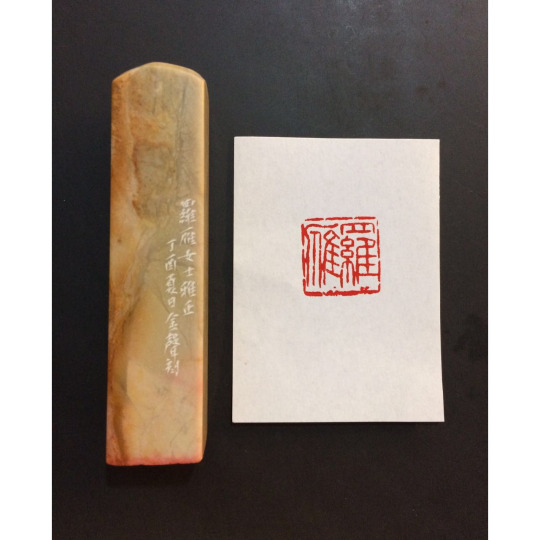
i'm going to do a second part focusing a bit more on scripts from the atla world, so keep your eyes peeled...
check out:
some more calligraphy examples from singapore's national gallery
disclaimer | more tips
#atla#atla culture#atla meta#avatar the last airbender#piandao#sokka#asian culture tips#some of the most beautiful calligraphy i saw at singapore's national art gallery#a really cool contemporary twist on the form#i took photos but my old lens was soooo bad so i don't have the specific ones i really liked but do check the link out <3
661 notes
·
View notes
Text
Is Katara "Motherly"? - The Discourse
The whole "is Katara motherly" discourse is a little annoying to me because for one thing its impossible to deny that in canon she acted motherly towards Aang, Sokka, and Toph, with Sokka even saying at one point when he thought of his mother Katara's was the face that came to mind.
But the other problem is that this fits into the shows themes so perfectly of children being thrust into adulthood and enormous amounts of responsibility too easily because of war and the subsequent (or end goals of) genocide, cultural genocide, and colonization. Katara's motherly characteristics are of the show's own making, they're right there in the text and their there for a reason, and although they weren't given enough attention as they should have been, there is no doubt that this is treated as, not exactly a tragedy, but as something bad and debilitating to Katara and her teenagerlike need to goof around with her friends.
But for whatever reason, the fandom seems to think that this characterization is fan made. Katara is supposedly forced into a motherly role by the fandom, particularly the zutara fandom, when in reality it is the show that does this to her. And the whole idea of momtara and dadko is that Katara doesn't have to be the mom anymore. She doesn't have to be the one solely responsible for the chores and the cooking and the emotional labor. She has a partner, and equal, who is willing to put forth the time and energy to assist her in what she feels obligated to do, and to tell her to go sit down sometimes before she burns herself out.
Could the other kids besides Zuko do this? Of course. But as we've already established, everyone in the gaang besides Suki shoves Katara into a motherlike role. Is this their fault? It's hard to say. Toph at least has a heart-to-heart with Katara about it, and Sokka's idea of her as a mother largely stems from trauma.
But my significant problem with Katara's motherly traits comes with the fact that there is no real closure to that arc in the "Runaway". Toph and Katara talk mostly about Toph's parents, and Toph tells Katara that she thinks she is capable of having fun. But other than that, there's nothing. The boys don't have to come to terms with the fact that Katara does not want to be seen (solely) as motherly or put in that position. Instead, the show gives us a few colorful explosions and subtlety implies that it is a little bit Katara's fault that she is seen that way. But again, that's not the fault of the zutara fandom or a reason the trope of momtara and dadko is problematic. It seeks to acknowledge these character traits in Katara, which a lot of kat@angers refuse to do, and give her a way to work past the trauma that caused them and help her adjust to a more healthy amount of stress and pressure on herself for a kid her age.
#the random desire to write in conclusion at the end of these#katara#atla#avatar the last airbender#zutara#anti kataang#the gaang#zuko#toph#sokka#suki#aang#bryke critical#anti bryke#atla meta#katara meta#zutara meta#katara deserved better
194 notes
·
View notes
Text
the performative accusation that shipping zutara (and occasionally this criticism is levied at jinko/zukka) is colonialist apologism has been addressed in some excellent posts, explaining the inaccuracies and problematic implications of this logic far better than i ever could - like this post and this one and this one and this one and this one.
and i know this topic has been talked about to death, but if you could indulge my contribution for a moment, i just find it interesting how this sentiment results from the cognitive dissonance of atla fans being unable to reconcile with the idea of their favorite show's political beliefs not lining up with their own.
atla is a largely philosophical children's show that at its core deals with themes of love, redemption, and destiny vs. free-will. atla examines these themes through an anti-colonalist, anti-imperalist lens that deconstructs the idea of racial divisiveness and the idea that people of different ethnicities are inherently different. this is message is pretty explicitly stated by guru pathik:
Guru Pathik: "The greatest illusion of this world is the illusion of separation. Things you think are separate and different are actually one and the same."
Aang: "Like the four nations?"
Guru Pathik: "Yes. We are all one people. But we live as if divided."
and also by uncle iroh:
"It is important to draw wisdom from many different places. If you take it from only one place, it becomes rigid and stale. Understanding others, the other elements and the other nations will help you become whole."
this theme is developed across three full seasons, with the crux of this message culminating in zuko's friendships with the gaang - despite coming from different nationalities and different backgrounds, they have all had their own experiences being hurt by the fire nation and work together to take down the oppressive fire nation government. the question of destiny vs. free will is also explored through zuko's character - despite starting off as an antagonist, he develops into a symbolic representation of how the fire nation's oppression hurts its own citizens. he unlearns the fire nation's imperialist propaganda while simultaneously unlearning his father's abuse. rather than following misguided beliefs of what he thought his destiny was as the heir to the throne, instead he forges his own path.
thus, to claim that zuko can never form a deep and meaningful relationship with any of the gaang because of his nationality goes unequivocally against the themes of the show. and a major part of this is because these are fictional characters being used to analyze different theoretical questions within the show and in some cases, are used as symbolic representations of different philosophical ideas - their friendships and their character arcs serve a purpose within the text that cannot be easily transcribed onto real-life dynamics between people.
it's illogical to criticize fans who are choosing to understand atla at the level of the themes that are presented by the text - who are interested in exploring similar philosophical questions brought up by the show through the context of relationships.
if you don't like the themes of forgiveness and redemption that atla explores, your criticism should be aimed at the writing of the show itself rather than other fans. because you are giving far more thought to the "implications" of a close friendship or romantic relationship between someone from an imperalist nation and someone from an oppressed nation than the writers ever did. (and if you fall in this camp of people, i would hope you wouldn't be reblogging fanart of zuko and the gaang together while simultaneously claiming zuko could can never escape the sins of his ancestors and can never form a deep relationship based on trust and intimacy with katara or sokka or jin - because that would just be hypocritical).
and as a side note, people seem to apply this flawed logic to zutara far more than other ships solely because the show spends the most time exploring the complicated nature of fire nation imperalism in the interactions between zuko and katara in the latter half of b3. this is because they've been juxtapositioned against each other and paralleled with aang since the beginning of the show in ways that toph, sokka, and suki are not, who have mostly been used to examine different themes. there simply isn't enough time to explore these complicated themes with all the other characters, even if they theoretically exist in zuko’s dynamics with these characters, so the writers focus the most on zuko's relationships with katara and aang, and these relationships are given far more narrative weight, so have more content to criticize. but zuko and katara also canonically become friends by the end of the show. if you want to discount the existence of their friendship, claiming that it will always be tainted by the fire nation's oppression regardless of what is shown in the text, then you also have to discount zuko's friendships with aang, suki, toph, and sokka - because even if this isn't shown as a permanent barrier to their friendships in the show, it’s also not shown as a permanent barrier to his friendship with katara. if your logic is solely based on the idea that a person's identity in a relationship as a colonizer or a victim is fixed and unchanging regardless of character development, this would apply to zuko's friendships with everyone else as well.
#zuko#katara#zutara#i have seen people say that the zutara dynamic makes them personally uncomfortable and that's fine - to each their own!#but it's hypocritical to only dislike zuko's relationship with katara while simultaneously exalting his friendships w aang or toph or sokka#just because the show doesn’t take as much time to explore these issues with other characters doesn’t mean the same dynamic doesn’t apply#my post#my meta
258 notes
·
View notes
Text
Since the discourse has reared its ugly head once more, the simple answer is no.
Aang was not a deadbeat, unsupportive, absentee father.
He loved all three of his children and was supportive of them. When Kya came out in the comics, she mentioned straight up that Aang was nothing but supportive of her and who she was. Aang made mistakes in parenting, but he was also stuck in one of the worst situations possible for him.
For one thing, it's been stated that Airbending culture has different views when it comes to family dynamics. Never once does Aang mention his parents, and it's clear that Air Nomads did not put emphasis on the standard nuclear family organization that other nations did. From context clues alone, and many have inferred in the past that Air Nomads were communal, so it stands to reason that their parenting was communal. Monks, Nuns, Masters—all of them were most likely parents to every single child. The responsibility of raising and educating a child was shared amongst the nomads, and that there was no real difference between biological and adoptive parents. Airbenders shared nearly everything, and that meant family as well.
Imagine you're Aang, spending twelve years of life being raised by every adult in the temple. Sure, he was exposed to nuclear family dynamics when visiting other nations and befriending Bumi and Kuzon, but his exposure to their culture was most likely limited. Now, not only is he a father to three beautiful children, but he must raise them in a way foreign to him. There are no other Monks to raise his children—it's just him and Katara. I've no doubt that Sokka and Toph chipped in whenever they could to ease the burden of parenthood, but they were leaders and figures of great importance as well. Not to mention that Toph had her own daughters to take care of.
Aang is also the Avatar, the central spiritual figure amongst the four nations. His presence would always be demanded in other nations. Peace Summits. Negotiations. Ceremony. Dealing with splintered Fire Nation cells and loyalists. Aang had to lead the people of all four nations back into balance, and he was in the unique and unenviable position to heal the scars of a 100 year war due to the absence of the Avatar.
Finally, the dude is also the Very Last Airbender. Of course he'd show favoritism to Tenzin. Bumi was a non-bender and Kya was a waterbender already taking after her mother. Aang was a war hero, a political figure, a man out of time and history, the Avatar, and the Only Living Airbender. The weight of his culture and people all rested on his shoulders, and so he passed on that responsibility and hope to the only other living Airbender at the time. Aang needed to spend time with Tenzin because only through Tenzin could the practices of the Air Nomads survive.
Aang was basically having to transition from a communal family mindset to a nuclear family's; he had to balance romance, fatherhood, and being the Avatar in a Wartorn World; and he had an obligation to every Airbender in history—millions of souls and their memories, passed on from one very flawed father to his newborn son. Every part of Aang's life as a father was met with trials and tribulations, and his family still came out loving him, albeit with some resentment underneath.
No parent is perfect, and Aang could have done so much better when it came to communicating with his children.
But none of his mistakes ever meant he was an abusive, cold, distant father.
He was overworked, acclimating to a style of family not his own, and desperately reviving a century-long dead culture all by himself. The fact that every single one of his kids still loved him and cherished him only solidified the fact that Aang was a father who did his very best.
Being the child of the Avatar would always mean living in his shadow. That resentment, of Aang being needed by the world while his children sought him out, would always be there. Doubly so for Tenzin, who grew up with the Avatar as his father and continued his life-long work of breathing life back into the Air Nomads. Say what you will, but at least Bumi and Kya had the freedom to choose who they wanted to be. Tenzin, no matter what, would always grow up to be the Airbending Master because no one else could.
Aang loved his children. Aang loved his wife. And they in turn loved him. But just like every family, complications rose up and planted the seeds of bitterness and resentment. The only thing that stopped these from blossoming into actual dislike of their family was that Aang's love and respect for his children was always genuine, and that Katara stood firm in making sure their children knew they were beloved.
Aang and Katara's family would never have been ideal in the first place, but they did their best.
And their best was certainly enough.
#avatar the last airbender#aang#katara#bumi ii#kya ii#bumi#kya#tenzin#avatar meta#paprikash ramblings#sokka#toph beifong
292 notes
·
View notes
Text
Sokka's character arc is so interesting to me because, as much as Avatar is a show that celebrates tradition and culture, Sokka doesn't begin to thrive until he starts to travel and learn from different kinds of people. He actually parallels Zuko in that way; they both begin with a closeminded perspective, and have to spend a lot of time being exposed to new ideas to realize their own potential. Zuko's arc is so much more drastic, though, whereas the way Sokka changes is almost subtle.
Crucially, he never lets go of his roots. Sokka is a warrior and a hunter and a tracker, and those skills are the base on which he builds his abilities as an tactician and inventor and politician. But Sokka needed to leave home and let go of the ego that his culture encouraged before he could accomplish any of that. He needed to learn to acknowledge women as warriors, and respect bending as an art, and think of the fire nation as people instead of monsters. He needed to meet other people who could help support and nurture his strengths like Piandao and the inventor. Sokka trades pride for humility, and then builds himself back up to real, earned confidence. It's kind of incredible to see. Just compare how stiff and unhappy he is in the first episodes to how easy and free he seems late in the series.
And after everything he's learned, I really can't imagine the Sokka at the end of the series just, going home and taking care of his tribe again. I think that he would do it, if they needed him to, but that environment would be almost stifling to him. I imagine a Sokka who travels, meets new and interesting people, uses his big whirring brain to solve problems. But who, of course, always has a familiar place to go back to when he needs it.
3K notes
·
View notes
Text
I do think there’s an interesting disconnect between how Katara and Sokka on one hand and Jet and his Freedom Fighters view Fire Nation civilians which is best explained by the different policies of imperialism the Fire Nation pursued in the Southern Water Tribe and the Earth Kingdom.
You see, the Fire Nation didn’t see the Southern Water Tribe as occupying desirable economic territory. Their genocidal attacks against the SWT are motivated due to fear of its power and contempt and hatred toward waterbending, but the Fire Nation has no interest in territorially occuppying the Antarctic, made particularly care by the fact they seem to lose most of their interest once the power of the SWT has been “broken.” As a result, there is no policy of occupation or building permanent settlements, while the campaigns themselves are almost solely carried out by uniformed soldiers and sailors. Fire Nation civilians are critical to the campaigns through their support for the war effort, but the SWT victims of the Fire Nation’s raids almost never see them, instead almost solely being exposed to soldiers and sailors. As a result, Katara and Sokka regard Fire Nation soldiers to be intensely threatening, but don’t regard Fire Nation civilians to be threats and are often even sympathetic to them. They make no commentary on the Fire Nation policies of settler-colonialism when they encounter them in the Earth Kingdom.
By contrast, the Fire Nation is intensely interested in the Earth Kingdom’s land and resources. It pursues a policy of settler-colonialism there, aiming to exert imperial control while seizing land and resources. “Civilian” settlers are a tool and weapon of imperial control and domination, critical for establishing power. Thus, Jet and his friends, as victims of settler-colonialism, perceive Fire Nation civilians as intensively threatening and as engaging in acts of aggression through their mere presence.
Thoughts? It all makes me feel like we really needed to have Jet join the Gaang.
#Katara#Sokka#Jet#Jet meta#Sokka meta#Katara meta#fire imperialism#southern water tribe#water siblings#water tribe#Earth Kingdom#settler colonialism#ATLA#Avatar The Last Airbender
389 notes
·
View notes
Text
I'm seeing so much commentary on people reacting to the live action atla toning down Sokka's misogyny
and I'm over here like this is a total non-issue because in my own rewrite of the show I already did that exact thing, it makes complete sense to do it and they should do it because it's a weaker aspect of the original show
Sokka's early misogyny is utterly cartoonish in comparison to the set up of the rest of the SWT, it doesn't feel realistic for the only teenaged boy in a dying culture surrounded by adult women with a grandmother who left a more out and out misogynist society to act the way he does
how Sokka "resolves" his misogyny is equally cartoonish, I never liked how in The Warriors of Kyoshi literally episode 4 of the show makes a teen girl compromise her own culture with a female only fighting tradition teach a boy who is supremely rude and disrespectful to her and then still be attracted to him afterwards, it's more misogyny to fix misogyny and is very obviously men writing about how to fix misogyny especially as they have Aang make a joke about Sokka wearing a dress after going through how meaningful the fighting costume is and how a lot of Asian clothing with hanfu influences like atla borrows from would have men in what to western eyes would be dresses, Aang has already seen multiple male authority figures in robes, the joke makes no sense
I also wouldn't consider Sokka's misogyny genuinely resolved after this, consider how the show deals with his romantic relationships with both Yue and Suki and how both can be seen as extensions of how Kataang is treated in the show, rewards for the hero, especially with how Sokka interacts aggressively with Hahn instead of respecting Yue's wishes whatever her reasons for them, I think an argument can be made that Yue's death is a fridging for Sokka's storyline rather than or in combination with being a consequence of Aang's failure as an avatar or the culmination of her own storyline where she fulfills her duties as a leader to protect her own people
Beyond his romantic relationships, while Sokka drops a lot of his more misogynistic language with Katara, he doesn't support her when she faces off with the NWT leaders to learn waterbending, and he still leaves the caretaking and food preparation and grocery shopping to her which is more common than him going out to hunt or gather in order to provide for the group while he takes a leadership role like determining their travel schedule and routes, it is not an even division of labor and falls along traditional sex stereotypes
In addition to his typical duties to the group, Sokka also remains invested in the trappings of masculinity after ep4, he's concerned about what's manly and how he compares to Jet for example, there's no investigation or interrogation in his interest in meat and hunting and how they relate to masculinity and his misogyny, in the episode with Piando, his insecurity as a non-bender is resolved by giving him a new male mentor and a new martial skill, sword fighting, which is masculine in both western and Asian cultures rather than assuaging his self esteem issues in any less stereotypically masculine ways, I also think it was done so he could compare more favorably to Zuko, another male character, and even his interest in engineering and mechanics comes with a male mentor and is a traditionally masculine pursuit
the show's poor handling of misogyny also extends beyond Sokka, with the NWT, the show acts as if Pakku is the only reason the tribe is misogynistic and the only consequences to that misogyny is that women can't waterbend and there are arranged marriages, and that both the NWT and Pakku's misogyny is resolved by allowing only Katara to learn to waterbend which she doesn't even earn on her own merits, she gets the opportunity because Pakku likes her grandmother
none of this is realistic, misogyny is not because of one bad apple, Pakku doesn't make Yue's arranged marriage, Chief Arnook does, he picked Hahn for her, and the show acts as if Arnook has no authority to compel Pakku to teach Katara or any ability to persuade him in order to reduce his culpability in the NWT's misogyny as its leader to make him a more respectable character so it's not uncomfortable when Aang and Sokka follow his orders in the battle later on, but women not being able to bend and forced into arranged marriages is still status quo when the gaang leaves, Yue's just dead
I'm not even convinced the show runners understand what's wrong with arranged marriage, the issue is not Yue can't be with Sokka who she likes and at most has a slight crush on cuz she's only known him for like two days, it's that she's being treated as male property, a broodmare, and a vehicle to ensure Hahn receives the throne because her father has no male heir and picked some guy to succeed him instead, like it's not explicit in the show but that is the implication based on the historical reality of princesses in arranged marriages, and the show has her get out of it only through death idc that she ascends to being a spirit, it's still a teen girl that dies
There's also no discussion by the show of the Earth Kingdom's misogyny when it has the exact same shit going on, Toph is the only female earthbender in the show not including avatars, there might have been a female earthbender in the background when Katara broke them out of prison, but I'm not really counting that, the entire army and Dai Li are all made up of men, the EK might even be worse because the show doesn't demonstrate that women and girls even have the capacity to earthbend aside from Toph and avatars and Toph doesn't even learn from a human, she has to learn from animals, the show treats this as commentary on her disability but the show has no compelling reason why it can't also be commentary on her sex, Toph was also originally supposed to be a boy so this could have ended up so much worse there literally would have been no female earthbenders aside from avatars at all, I'm not counting Oma as she might just be a mythological figure not a real person that once lived
The Fire Nation kinda barely avoids the same issue, Azula is the only named female firebender aside from avatars in the show but she has two female sidekicks who despite being non-benders show martial skill and there are clearly female soldiers and guards in the FN military so there are much stronger implications of female firebenders existing and being completely allowed to train their abilities and that Azula isn't exceptional in that respect like Toph is, only for being a prodigy with blue fire
Azula was also originally supposed to have an arranged marriage in s3 and they dropped it in favor of showing that royal and noble girls could casually date in the FN which has wild implications for women's empowerment in the country more so than but especially in combination with the fact women can train and join the military (which is why I say the FN is not fascist it's literally the least misogynistic country aside from Kyoshi and by like a country mile so it's literally not misogynistic enough) not that the show does anything more than minor teen drama with it
again, the vast majority of this misogyny is completely unremarked upon by the show especially after s1 when they leave the NWT, it is clearly a fictional world made by men with no true understanding of misogyny just a vague awareness that misogyny is bad and what the really obvious and outdated examples of it are, this is a narrative inconsistency in the show to have the examples and commentary on misogyny be so cartoonish in the beginning and then disappear after s1
your options to resolve this inconsistency is to either go all in with more realistic misogyny and provide commentary on all of it but this takes effort and will be divisive, or take the easier route and ease off the cartoonish-ness of it and comment less on it to avoid drawing attention to all instances of misogyny in the show
obviously Netflix was gonna do the latter
(not me tho, I'm making it less cartoony and dealing with it in my rewrite)
#atla#live action atla#atla critical#anti bryke#anti kataang#anti sokka#its not really anti him more anti how his character was written and dealt with#long post#meta
384 notes
·
View notes